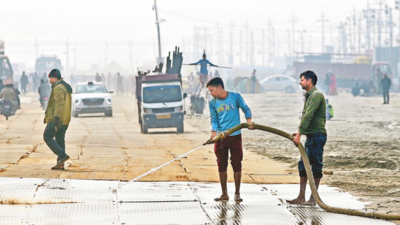The Prayagraj Mela Authority has engaged nearly 10,000 sanitation workers to ensure a clean Maha Kumbh. Through the Swachh Kumbh Fund, the govt is providing them accommodation, food, and free education for their children. Eco friendly equipment are being used which operate without fuel, or electricity, thereby helping in reduction of environmental impact.
Being manually operated, the equipment do not raise dust, and their ergonomic design ensures comfort during use.
1.5 lakh toilets in mela area
Under the Swachh Kumbh initiative, the Prayagraj Mela Authority has set up around 1.5 lakh toilets and urinals in the Maha Kumbh area.
The sanitation infrastructure includes jet spray cleaning systems and a comprehensive cesspool operation plan, along with provisions like septic tanks and soak pits.
To ensure cleanliness and safety, all facilities are being monitored via QR codes. A total of 55 vendors have been empaneled for large scale installation, ensuring that devotees and visitors have access to community toilets.
Advanced equipment, including 10 manual walk-behind sweeping machines and two battery-operated vacuum-type litter pickers worth Rs 45 lakh, are being deployed in the mela area.
A compact manual sweeping machine has also been deployed to clean paved ghats, footpaths, roads, and public places within the mela area, enhancing the convenience and experience for devotees, tourists, and bathers from the country as well as abroad.
This eco friendly equipment operates without fuel, or electricity, which helps in reducing its environmental impact. Being manually operated, it cleans effectively without raising dust, and its ergonomic design ensures comfort during use.
The machine’s efficiency in cleaning roads makes it easy to operate and maintain, allowing sanitation workers to perform their tasks effectively while contributing to a cleaner, greener environment.
A battery-operated vacuum-type litter picker is deployed in the mela area. It is a battery-operated, ride-on and walk-along power-suction vacuum designed to pick up litter and debris. Its compact size allows for easy operation in any part of the fair, ensuring thorough cleaning of various surfaces. Attached to a vehicle, this advanced equipment offers excellent mobility and eliminates the need for manual labour. Its powerful vacuum functionality ensures quick and effective waste collection, while its durable battery reduces environmental impact and carbon emissions.
Automatic blower mist machines for mosquito-free kumbh
The health department has introduced special arrangements for both saints and devotees, aiming to make Kumbh area free of mosquitoes and flies. To tackle insect-related issues effectively, an innovative system has been introduced, deploying automatic blower mist machines capable of eradicating mosquitoes and flies within 30 minutes of receiving a call from any part of the mela area. A total of 110 state-of-the-art blower mist machines and 107 mini fogging machines are being deployed across the mela area. These modern devices are expected to enhance the overall experience of devotees.
At least 45 malaria inspectors have been assigned duties, along with 28 assistant malaria inspectors who will look after the well-being of seers and devotees. Five district malaria officers (DMOs) have also been stationed separately to address any challenges and maintain uninterrupted services.
QR code-based cleanliness monitoring
Apart from installation of 1.5 lakh toilets and urinals, a QR code-based monitoring system is being launched to track sanitation level in toilets. Any reports of unclean facilities will trigger immediate action through a dedicated app, allowing for swift cleaning within minutes. Additionally, a jet spray cleaning system has been introduced which will eliminate the need for manual cleaning. A cesspool operation plan is also in place to manage septic tanks effectively. The responsibility for monitoring these toilets has been entrusted to 1,500 Ganga Sevadoots, who will inspect each toilet every morning and evening. Using an ICT app, they will scan the QR code on each facility and answer a set of yes-or-no questions, such as whether the toilet is clean if the door is intact, and whether there is sufficient water.
At least 500 dedicated Ganga Praharis are working round-the-clock to ensure cleanliness and purity of rivers. Ganga Praharis, known as vigilant custodians of river cleanliness, are assigned duties at all 41 ghats. Working in teams of 15-20 at each ghat and operating in shifts during the Maha Kumbh, they are not only cleaning the rivers and ghats but also educating devotees on the importance of preserving river sanctity. Under the Namami Gange project, the ‘Ganga Praharis’ are dedicated to ensuring the cleanliness of rivers and ghats while conserving aquatic life, in collaboration with the Wildlife Institute of India. They are also conducting round-the-clock cleanliness drives, using nets to remove waste from the rivers and ghats.
Swachhta mitra suraksha bima scheme
Swachhta Mitra Suraksha Bima Scheme will provide comprehensive health and life insurance coverage for sanitation workers, ensuring their safety and security during the mega event. The Prayagraj Mela Authority has set up 1.5 lakh toilets across the mela area and over 10,000 sanitation workers are also deployed to maintain cleanliness throughout the event. Under the Swachhta Mitra Suraksha Bima Scheme, all sanitation workers and sailors involved in the Mahakumbh will receive life insurance coverage of Rs 2 lakh.




